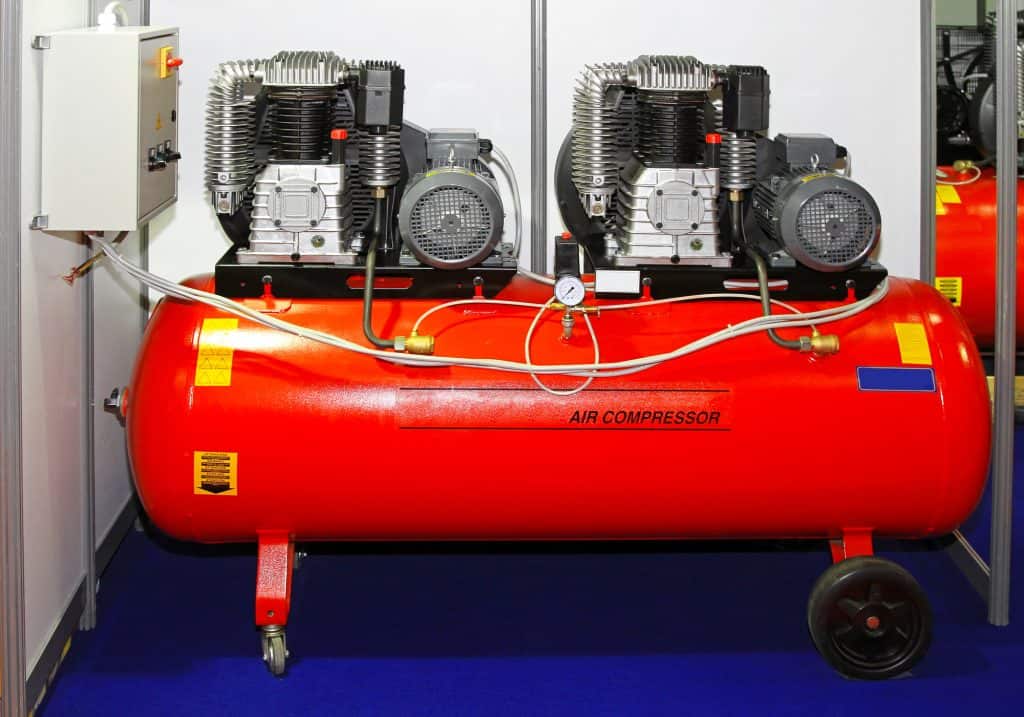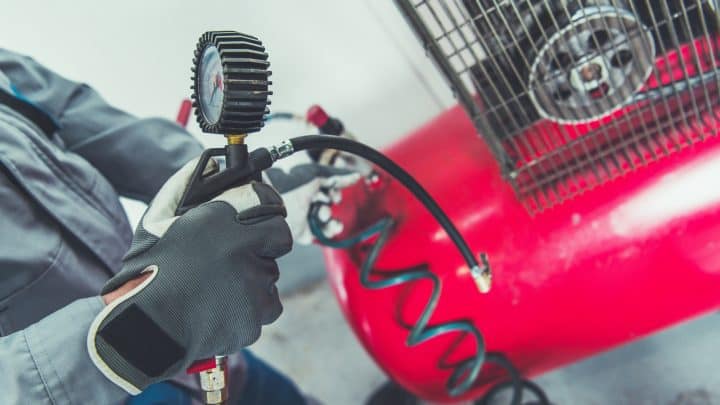From basic pneumatic tools to larger pieces of machinery, air compressors help power a variety of essential shop elements. However, compressed air requirements vary from shop to shop, and the price you’ll pay for a compressor will depend mainly on the necessary output.
That said, you don’t want to overpay for what you need, so what’s a reasonable price for a shop air compressor?
You could reasonably expect to pay $150 to $500 for your shop air compressor. The average price will rise along with your compressed air needs. For automotive and manufacturing shops spending a few thousand dollars wouldn’t be considered unreasonable.
When you’re pricing your air compressor, you’ll want to consider many different factors, including the available space in your shop and your power requirements. Below, I’ll go over how to decide on the best shop air compressor for you and let you know what you should reasonably expect to pay.
Average Cost for Home Workshop Air Compressors
You could expect to pay between $150 and $300 for a basic air compressor for your shop at home. Air compressors in this price range work reasonably well for all of the following:
- Tire inflation
- Finish nailing
- Stapling
- Light framing and roofing
- Short operating times
These air compressors are typically portable, low-maintenance, and battery-powered, which makes them convenient. However, their smaller size and moderate power also limit their capabilities. We went over some uses for small, 3-gallon air compressors in this article.
While affordable, they aren’t considered “heavy-duty,” and many shops might require something a little more robust. Air compressors in this price range have smaller tanks, lower air volume, and less horsepower, meaning they aren’t ideal for more continuous operations.
Actually, I’d wager that most shops would require a bit more power.
Average Air Compressor Costs for Mid-Size Shops
If you spend a lot of time in your shop or rely on it for business, you may need a compressor that operates efficiently for more extended periods.
Mid-range air compressors sell for thousands of dollars. However, many shops would likely get by with a $500 to $1,000 piece of equipment. Compressors in this price range tend to be better suited for the following applications:
- Airbrushing and blowing
- Painting
- Grinding and cutting
- Bolting and wrenching
- Sanding
- Brad nailing
That isn’t to say that you wouldn’t be able to perform these tasks with a more affordable compressor. However, smaller air compressors may not provide the power you need, and they wouldn’t tolerate these tasks for extended periods.

Air Compressors for Mechanical, Automotive, or Manufacturing Shops
Depending on the workload, spending a couple of thousand dollars on a shop air compressor wouldn’t be unreasonable.
For example, if you rely on compressed air for frequent mechanical work, torquing, or light machinery, you might need a sophisticated air compressor setup.
Compressors in the $1500 to $7000 range store much more significant amounts of compressed air, meaning you can use them for more extended periods before the tank needs a refill.
Compressors in this price range also have more powerful motors and deliver greater air volume for a given PSI. Most importantly, they maintain that output for longer so that you can keep working without interruption.
Air compressors of this caliber are essential for shops that require a lot from their air compressors.
What Factors Influence the Cost of a Shop Air Compressor?
As you shop for air compressors, you’ll notice that the prices vary quite dramatically. While some of the costs vary depending on brand and model, other factors are at play.
The factors that influence the cost of an air compressor are the compressor’s size, horsepower, storage capacity, and air delivery rate. Bigger, more powerful compressors will be priced higher, but these compressors often aren’t necessary for smaller shops.
Here’s a quick breakdown of the most critical metrics:
- Air delivery: Air delivery is measured as CFM (Cubic Feet per Minute) at a given level of pressure or PSI (Pounds per Square Inch). Generally, compressors with a high CFM can supply more air.
- Storage capacity: Air compressor tanks are measured in gallons, which will tell you how much air the tank can pressurize at one time. The more air you have pressurized, the longer you’ll be able to operate your tools without losing pressure.
- Horsepower: While not as important as the previous two, the horsepower of an air compressor will tell you how powerful the motor is in terms of pressurizing air. It’s also important to look at this feature in relation to the air pressure. An engine that produces the highest PSI at the lowest HP is the most efficient.
Portable vs. Stationary Air Compressors
Whether or not you can lift and carry the air compressor around is often an indicator of price. Portable compressors are generally more affordable, given that they’re smaller and less powerful.
Some of the larger compressors will have a set of wheels attached to the frame so that you can move them around the shop, but they tend to be much larger than a genuinely portable compressor.
Larger shops tend to have heavy-duty, stationary compressors that provide more air delivery. These compressors are most commonly found in commercial and industrial applications and would cost thousands of dollars.
How To Determine Which Air Compressor Is Right for You
A reasonable price for one shop might be unreasonable for another, so understanding your compressed air requirements will help you identify a good price range.
Here’s an easy way to get an idea of what you need:
- Find the CFM requirements for your most powerful or most used tools. Pneumatic tools usually list air delivery requirements, often written as CFM at (X) PSI.
- Search for compressors that have a matching CFM rating. If you buy a compressor that supports the operation of your most powerful tools, it’ll undoubtedly be able to handle all of the others.
Finding an air compressor that you can use with your tools is essential because some devices require a specific air volume to work correctly. If you start with this metric, you can potentially eliminate a lot of compressors from the equation.
If you’re unsure of your tool’s CFM requirements, you can go online and search for its specs. You should be able to find this measurement somewhere in the specifications.
Consider Your Compressed Air Usage
Maybe you don’t have a lot of powerful tools, but you frequently use the tools you own. If this is the case, the frequency you require compressed air should also play a role in your purchasing decisions.
When your compressor tank runs out of air, your tools will lose pressure, and your tank will refill itself. If your tank is too small for what you’re doing, this might happen a lot while you’re trying to work.
If you know that you’ll be using compressed air for extended periods, consider looking for compressors with larger tanks. A larger tank ensures you can run your tools without interruption, potentially avoiding productivity losses.
Other Considerations for Buying a Shop Air Compressor
Buying a small, portable air compressor for basic tools in your home workshop is relatively straightforward. However, if you require something more sophisticated, there are other things to consider, including:
- Potential operational costs: Compressing air often consumes a lot of electricity. If you’re looking for an electric compressor that you’ll constantly be running, you might want to consider the cost of running and maintaining it.
- Don’t buy more than you need: Some people assume that they should purchase a powerful compressor, thinking it’s better to have too much than not enough. While this might be true, you might unnecessarily increase your expenses, both in equipment and operational costs.
- Available space: Also, consider how much space you have for a compressor in your shop. Some compressors have horizontal tanks, while others have vertical tanks. While certainly possible, storing them outside isn’t ideal, so definitely take this into consideration.
Considering all of these factors will help you be more strategic in your purchase. So, if you keep these factors in mind, you’ll be able to find something that’s reasonable for your specific needs.
Conclusion
You’ll have no problem finding a basic, portable air compressor for under $300. However, if you require something with more power and air delivery, it’s not unreasonable to spend several hundred or even $1,000 or more on a piece of equipment.
To get yourself in the most appropriate price range, you’ll want to determine your shop’s compressed air requirements. These requirements vary from shop to shop, but by considering your tools and usage, you’ll get a better idea of what you need to spend without overpaying.

